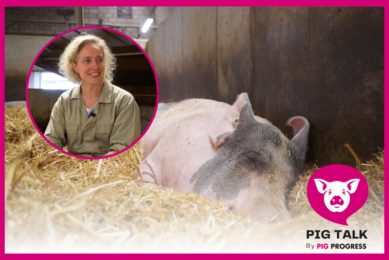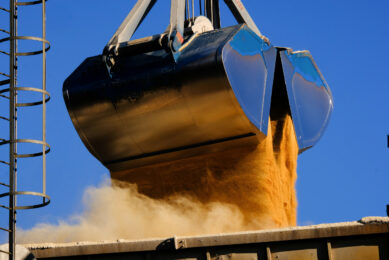Oil does, but adding method has no influence pig performance

British scientists studied the effect of method of vegetable oil blend application, either sprayed onto or incorporated within pelleted diets, on the performance and digestibility of dietary components in finishing pigs.
A secondary aim of the study was to evaluate the source of energy, i.e. starch vs oil on pig performance and the coefficient of total tract apparent digestibility (CTTAD).
Diets were formulated from either by-products (maize gluten, maize gluten feed, pollards and rapeseed) or cereals (barley and wheat) to which vegetable oil was added (g/kg) in two different ways: 40 incorporated within the pellets (IN) or 30 sprayed onto the pellets (SP) + 10 (IN).
Two studies
In study 1, 48 Large White × Landrace pigs (average weight 50.4 kg) on a research herd were used to determine CTTAD of dry matter (DM), crude protein (CP), neutral detergent fibre (NDF), lipid, energy and phosphorus and digestible energy (DE) content.
In study 2, 960 Landrace × Large White pigs on a commercial herd, housed in groups of 20 from 14 to 24 weeks of age, were used to assess production performance and carcass characteristics.
Oil addition increased the CTTAD of lipid and phosphorus and decreased phosphorus excretion in both by-product-based and wheat/barley-based diets.
The total amount of nitrogen excreted also decreased when oil was added to the wheat/barley-based diets but not the by-product-based diets.
The CTTAD, except for lipid CTTAD, and pig performance were similar whether oil was added by 40-IN or 10-IN + 30 SP.
Lipid CTTAD of by-product-based diets increased when oil was added by 10-IN + 30-SP compared with 40-IN.
The addition of oil to by-product-based and wheat/barley-based diets improved the DE content of the diets on a DM basis by on average 0.6 and 0.85 MJ/kg DM, respectively in study 1 and FCR by on average 0.18 and 0.19 kg/kg, respectively in study 2.
Pigs offered wheat/barley-based diets had higher DM CTTAD in study 1 and higher growth rates, finish weights and carcass weights in study 2 compared with by-product-based diets.
The excretion of nitrogen from wheat/barley-based diets was lower than from by-product-based diets.
Better performance
In conclusion, the performance of pigs was better when they were offered wheat/barley-based diets.
Oil addition improved FCR with both wheat/barley-based and by-product-based diets but the method of oil application had no significant effect on pig performance or the CTTAD of the diet.
This study was published in Animal Feed Science and Technology, Volume 156, Issues 3-4, 30 March 2010, Pages 57-74. To obtain the full research report, go to Elsevier Science.











